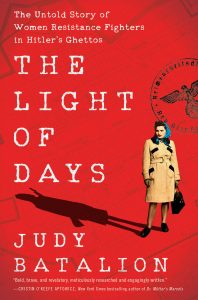Reviewed by Norman Simms

Judy Batalion. The Light of Days: Women Fighters of the Jewish Resistance, Their Untold Story.
London: Virago Press, 2021.
New York: William Morrow/HarperCollins, 2020.
xvi + 556 + 16 plates of black and white photographs. + 1 map.
This is a very well-written, powerful, important and sad book. It is about young women, usually between seventeen and thirty, who give themselves to the fight against the Nazi Holocaust with everything they have. These young women play more than the role of cooks, nursemaids or aides in the precarious shelters where Jews attempt to hide from the murderous bands that hunt them down and more than as couriers bringing messages between different groups of resisters and escapees. They are often the organizers, the spies who work to manipulate the systematic cruelty in Poland, and who give encouragement and courage to those whose lives are being crushed. The name for these women is kashariyot.
When a kasharit arrived with news about families and politics, it was a sign that they hadn’t been forgotten, that life went on outside their confined tortures that not everyone was depressed. These women were lifelines, “human radios,” trusted contacts, supply dispatchers, and sources of inspiration. (p. 176)
Though many of these stories have already appeared, some in collections made near the end of the war and after the defeat of the Nazi regime, written in Yiddish or Polish or other East European languages, the author is able to develop the narratives and the characters into a moving text. The book also provides background to the persons, events and ideologies that are at work. Some of the scenes of horror are more vivid—and harrowing in their starkness— than in most autobiographies and professional histories and novels of the type, giving a sense of reality that is too often missed. But it is above all the moral, emotional and psychological struggles within the lives of the women themselves that’s its persuasive power rests. It was Batalion says, “A constant pageant of deception.”
Coming from many walks of life, religious and secular, wealthy and poor and sometimes already affiliated to Jewish and Zionist causes or until the beginning of the round-ups and killings indifferent to politics, these women have an almost instinctive commitment to fight the Nazis and to be active in helping others. Throughout the book their stories show them facing with grim determination the need to hide their emotions, play various role to achieve their goals—smuggling guns, assisting families escape, ferreting out secrets from soldiers and policemen—and never to let their guard down, cautious before trusting anyone, and keeping themselves alert in the most trying of circumstances.
Sometimes, too, they used their weapons and a few fought in the Warsaw Ghetto Uprising, but most they did their part in smaller towns and smaller groups. Those girls who looked Aryans could do certain tasks, others who had the faces of Polish peasants other things, but all, no matter what, did their best to keep strong in mind and body so that they could whatever was needed. If possible, they cheered each other on with songs and speeches; or they lay silently in dark cellars and waited for the time to act. They watched each other suffer and die. There was no time to be young or to have private emotions.
Many of these women did not live to the end of the war, victims of disease, betrayal and starvation. Few of their names or backgrounds are known, although Judy Batalion does her best to give them a place in Jewish history as true martyrs. For those young women resisters who did survive, the aftermath of their ordeal was neither pleasant nor easy. Many of the men’s associations formed to memorialize the activity of Jewish resistance could not bring themselves to hear about what the women did, if they believed them at all. Ideological differences also kept the survivors from speaking out. That is why it is important, even at this late date, a lifetime and more after the events it recounts, for such as book as The Light of Days to take an honourable place in the library of books on the Holocaust.
- Like
- Digg
- Del
- Tumblr
- VKontakte
- Buffer
- Love This
- Odnoklassniki
- Meneame
- Blogger
- Amazon
- Yahoo Mail
- Gmail
- AOL
- Newsvine
- HackerNews
- Evernote
- MySpace
- Mail.ru
- Viadeo
- Line
- Comments
- Yummly
- SMS
- Viber
- Telegram
- Subscribe
- Skype
- Facebook Messenger
- Kakao
- LiveJournal
- Yammer
- Edgar
- Fintel
- Mix
- Instapaper
- Copy Link









